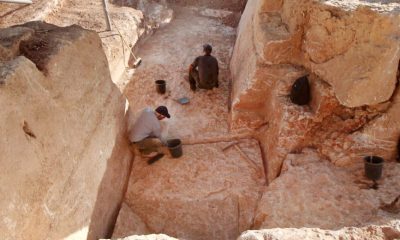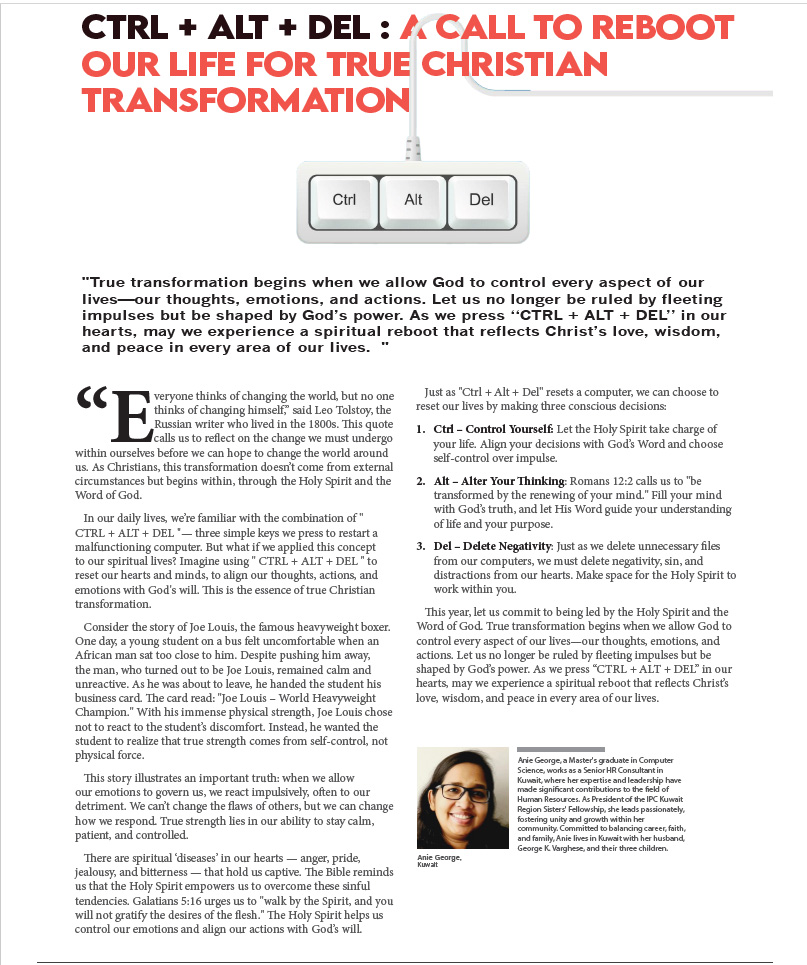Articles
Book of Ruth — 3 things that help us persevere in hope (part 1)

The book of Ruth shows that even amid a dark period of unthinkable wickedness and rebellion, God is still working to accomplish His purpose of redemption. This book is also a reminder that even when it seems an entire nation has rejected the Lord, His faithful remnant remains.
With everything we face in our world today, it is a great relief to look at God’s faithful, covenant love in the first two chapters of this book. God’s covenant love triumphs over everything against His people so that we persevere in hope. Paul writes in Romans 8:35: “Who will separate us from the love of Christ? Will tribulation, or distress, or persecution, or famine, or nakedness, or peril, or sword?” In Ruth 1-2, we see a number of these things trying to separate God’s people from His love. Yet, these chapters are a living illustration of the truth of Romans 8:35-39 and God’s enduring, unbreakable love for His people.
There are three things from Ruth 1-2 that enable us to persevere in hope on the firm foundation of God’s covenant love.
First, to persevere in hope, we need to recognize the reality of adversity.
The story of redemption in Ruth is born in the cradle of adversity. In just this chapter, Naomi undergoes five severe experiences of difficulty.
As the story opens, we meet a family of four, who are confronted with famine in Israel. This famine was such a severe trial that it prompted Elimelech, Ruth’s future father-in-law, to uproot his family to Moab.
This family then faces the adversity of living among unfriendly foreigners outside the land that God gave to Israel. Moab had long opposed Israel and its military conquests.
Naomi’s third trial occurs when her husband dies, and she now was burdened by being a widow in a foreign land. Her sons were probably not very old, so they would have been of limited help.
After Naomi’s sons married foreign women, they died as well, extinguishing Naomi’s family line. She is bereft not only of her family but also of any legal help or protection.
Naomi eventually learns that the Lord has brought the famine to an end and decides to move back home. It was extremely dangerous for a woman to travel alone, but Naomi’s options at this point were to remain in Moab as an unprotected widow or to take a chance on the journey and hope some distant relative back home might assist her.
When Naomi arrives home, the intensity of the adversity she has faced is not lost on her. She recognizes the difficulties she has experienced, and she has been, at least in her understanding, irrevocably changed because of her trials. Naomi left a woman who was full of joy, with a family and high hopes. She came back destitute and hopeless.
The language of this opening chapter is reminiscent of the book of Job. Naomi loses everything she values in her life. Her trials seem to happen in rapid succession, without a respite from the adversity. Also, like Job, she recognizes everything comes from the Lord’s hand and providence. Whether Naomi is proven right about what God is doing is yet to be seen, but the reality is that God is the one who has moved her through it all.
If we’re encountering adversity, remember God is working in and through our lives. Our trials have not taken God by surprise. Adversity is providence.
Second, to persevere with hope, we need to respond to adversity in faith.
When Naomi decided to leave Moab, her two daughters-in-law desired to follow. She encouraged them to return to their mother’s house. Eventually, Orpah was persuaded to go home, but Ruth would not be persuaded.
Ruth is determined to follow Naomi, wanting to convert to become an Israelite. In doing so, she understands she must forsake her gods and worship only the God of Israel; unexpectedly, especially given the context of Judges, she freely volunteers her unwavering loyalty to Israel’s God! Here we have this foreigner, excluded from the Lord’s assembly by her nationality, committing herself to the Lord until death. What a picture: Ruth the Moabitess is utterly loyal to the God of Israel, while Israel itself continually forsakes Him.
This conversion appears to be genuine. Ruth does not say Naomi’s gods will be her gods; instead, she specifically names Israel’s God. Moreover, Boaz later recognizes Ruth came to take refuge under the Lord’s protection. Through Ruth’s relationship with her Israelite family, she saw the futility of the Moabite gods and the glory of the God of Israel — and she would not be parted from Him.
What was it about the God of Israel that Ruth found so attractive? Ruth’s first exposure to Him was a God whose people were suffering from famine. Then, her father-in-law died, and her husband and brother-in-law passed away. She was a barren widow. She and her mother-in-law became embittered and impoverished.
Despite all that had happened, Ruth wanted to follow the Lord because she had found the truth. Once Ruth had recognized the truth, it didn’t matter the cost or the external trappings, nor did it matter that the lie looked more promising in the short run. The God of Israel was the true God, and she would not relinquish Him.
Most importantly, though, this woman responds to adversity with faith. She doesn’t make her decision based on emotion or external circumstances. Instead, she makes her decision based on God’s truth.
Ruth’s response is so instructive. When we struggle with adversity, does truth drive our response? Or does the flesh lead to despair rather than hope? When we tell others the Gospel of Christ, are we confident that the power is in the truth, not in our presentation? We need to remind ourselves repeatedly that Scripture is the truth, and our God is the true God against all the world’s lies.
Third, to persevere with hope, rest in God’s faithfulness through adversity.
Chapter two of Ruth shows God’s faithfulness to Ruth and Naomi.
When she settles in her new home, Ruth takes the initiative to provide food. The field that Ruth discovers to glean belongs to a man named Boaz, who was related to Naomi’s late husband. When Boaz finds out Ruth’s identity, he instructs his workers to ensure she is provided for and protected. Boaz also tells Ruth he has provided for her because of her godly reputation.
In the end, God’s provision to Naomi and Ruth is more than abundant — not only of food but also of physical protection, something two widows would have severely needed in their culture. Moreover, it appears that a budding romance is beginning between Boaz and Ruth.
As we look at this chapter, God’s provision for Naomi and Ruth is unmistakable. God provides for the ladies in their distress in more ways than initially Ruth even was seeking. This is how God works. He regularly provides for His people even during adversity. We can rest in His care and love even if the entire world around us has been turned upside down.
Here we see two women who were able to persevere in hope because of God’s faithfulness. Without God, they would have had no hope — and neither does anyone apart from faith in Christ. It’s amazing to consider that Ruth was part of a population that God said was never allowed in His people. And yet Ruth was received by God because she trusted in Him. Jesus turns away no one who comes to Him in faith. What a marvelous and reassuring promise of hope and salvation!
Sources:Christian Post
Articles
CTRL+ALT+DEL: A call to reboot our life for true Christian transformation
Articles
7 ways we rebuild through Christ

When a person comes to Christ, it’s not just about being forgiven and waiting for heaven. Salvation is an ongoing process of regeneration where a person becomes a new creation, reshaped by the power of the cross. This process involves rebuilding every area of life according to God’s design. Today, we’ll explore seven key areas that are rebuilt in Christ.
1. Our personal life is no longer based on self
We are born in sin and naturally live according to the lusts of the flesh (Ephesians 2:1-3).
But in Christ, we begin to live a cross-shaped life, learning to deny ourselves and follow Jesus (Mark 8:34-36).
“And calling the crowd to him with his disciples, he said to them, ‘If anyone would come after me, let him deny himself and take up his cross and follow me’” (Mark 8:34-36).
The crucified life is a life where self is no longer at the center — God is. We are called to serve others, rather than live for self-gratification(Galatians 2:19-20).
We actually find our life when we lose it! We discover the best version of ourselves when we die to ourselves and allow Christ to live in us and through us.
2. Our families are shaped according to God’s Word
After coming to Christ, family life should be rebuilt and shaped by Scripture. One way is to disciple our children and teach them about God.
Psalm 78:5-7:
“He established a testimony in Jacob and appointed a law in Israel, which he commanded our fathers to teach to their children, that the next generation might know them, the children yet unborn, and arise and tell them to their children, so that they should set their hope in God.”
Furthermore, parents are instructed to raise their children according to the Word of God, ensuring that our homes reflect biblical values and generational faithfulness (2 Timothy 3:15-16).
3. We do business God’s way
The Bible teaches that work is not merely a means to provide for ourselves; it is an act of worship.
Genesis 2:15 illustrates that Adam was called to work even before he had a wife and children. It was an act of worship since, as His image bearer, he imitated the God who worked 6 days before He entered His rest.
“The LORD God took the man and put him in the garden of Eden to work it and keep it.”
Like Adam, we work because we are made in the image of a God who worked to create the world. In business, we walk in integrity, treat employees as partners, equip them to flourish in work, and prioritize honoring God. This means creating environments that reflect God’s kingdom values, including allowing people to worship on Sundays.
4. We use our wealth to spread the Kingdom
Deuteronomy 8:18 reminds us that God gives us the ability to produce wealth, not just for personal gain, but to advance His Kingdom. As believers, we are called to steward our finances in a way that reflects God’s mission, investing in the expansion of the gospel, meeting needs, and helping to establish justice and mercy on earth.
Money is not evil, but the love of money is evil. Money can also be used to advance the kingdom.
I.E., God was able to use “The Good Samaritan” because he had wealth (Luke 10).
God used Joseph of Arimathea who buried the body of Jesus because he had financial resources.
God used Lydia, who had her own business and started a church because she owned a home and was a business owner (Acts 16).
5. We are called to reflect Christ by serving our communities
Titus 2 and 3 show us that we are not just called to serve within the walls of the church, but to be profitable to all people.
2:7 says “Show yourself in all respects to be a model of good works …”
2:14 says Jesus purified people “who are zealous for good works.”
3:14 says “let our people learn to devote themselves to good works …”
This means our communities should see the light of Christ through our good works.
History is replete with how Christ’s followers have rebuilt cities and nations and served humanity in a way that forever impacted nations.
Isaiah 61:4 says:
“They shall build up the ancient ruins; they shall raise up the former devastations; they shall repair the ruined cities, the devastations of many generations.”
6. The Church is called to reparent and rebuild individuals
Jesus’ invitation to “follow me, and I will make you …” demonstrates the Church’s role in rebuilding lives (Matthew 4:19). Through biblical discipleship, we help people discover their God-given purpose and destiny.
Discipleship is more than instruction; it’s walking with people to see them transformed and equipped to fulfill their calling in Christ.
Jesus didn’t say, “follow me and I will give you a weekly bible study. He gave people the opportunity to do life with Him, which created the environment to make disciples and bring about personal transformation.
7. The Church participates in the renewal of all things in Christ
God called Adam to bring His influence on the whole earth.
Genesis 1:28. God’s ultimate plan with and through the church participating with Jesus is to renew all things through Christ (Ephesians 1:9-11). We are not just waiting for the second coming; we are active participants in the restoration of creation through the gospel. As we live in alignment with God’s kingdom, we anticipate the fulfillment of this promise in the climax of history with a new heaven and new earth (Revelation 21:1-8).
Five practical takeaways
1. Embrace daily denial of self: Evaluate your life and ask where you need to surrender personal desires in favor of following Christ. This is the first step toward living a cross-shaped life.
2. Create a family discipleship plan: Begin setting time aside weekly to disciple your children or encourage your family members in the Word of God. Make your home a center for spiritual growth.
3. Work with integrity and purpose: Consider how your work can reflect God’s glory. Are you treating your employees or coworkers with dignity and empowering them, or are you merely using them to get your work done?
4. Be a faithful steward of wealth: Make a decision to invest in Kingdom causes. Pray about where your resources can make a Gospel-centered impact — supporting missionaries, funding outreach, or caring for the poor.
5. Serve your community: Identify a way to serve your community this week. Whether it’s through volunteering, meeting a need, or simply being present in a meaningful way, show Christ’s love in action.
As we participate in this process of rebuilding, God transforms us, our families, our work, and, ultimately, the world around us. Let us surrender fully to Christ and trust Him to rebuild every aspect of our lives for His glory.
Sources:Christian Post
Articles
God’s peace and the world’s peace are not the same

Peace is not just a feeling, it is also a condition, a mindset, a state of being. It is a relationship with God Almighty who created you and loves you. Peace is where we want to live. But we live in an unpeaceful world full of strife, envy, jealousy, rage, competition, anxiety, fear, worry, and yes lust. We crave what we don’t have, and we don’t want what we do have. We long for peace.
The peace of God is the opposite of all that the world has to offer.
The world’s definition of peace is a state of tranquility, freedom from disturbance, and harmony in personal relations.
Who doesn’t want that?
Now listen to the story of Jesus and the peace He offers you and me.
“And the angel said to them, ‘Fear not, for behold, I bring you good news of great joy that will be for all the people. For unto you is born this day in the city of David a Savior, who is Christ the Lord. And this will be a sign for you: you will find a baby wrapped in swaddling clothes and lying in a manger.’ And suddenly there was with the angel a multitude of the heavenly host praising God and saying, ‘Glory to God in the highest, and on earth peace among those with whom he is pleased!’” (Luke 2:10).
Jesus comes to give peace!
Now you may think you know what peace is. But listen to what Jesus says about it,
“’Let not your hearts be troubled. Believe in God; believe also in me. In my Father’s house are many rooms. If it were not so, would I have told you that I go to prepare a place for you? And if I go and prepare a place for you, I will come again and will take you to myself, that where I am you may be also. And you know the way to where I am going.’ Thomas said to him, ‘Lord, we do not know where you are going. How can we know the way?’ Jesus said to him, ‘I am the way, and the truth, and the life. No one comes to the Father except through me’” (John 14:1).
Look at what Jesus also says in John 14:27: “Peace I leave with you; my peace I give to you. Not as the world gives do I give to you. Let not your hearts be troubled, neither let them be afraid.”
Jesus is the way to peace. And you may say, “Oh, I know what peace is!” But you don’t. You don’t know what peace is until you know Jesus. His peace is not like the world’s peace.
If you know Jesus, you will experience peace. If you don’t know Jesus, you won’t. Not in any real sense, that is.
The peace of God is a state of wholeness, calmness, and completeness.
As you compare the two definitions, the world’s definition of peace is an external definition based off circumstances and human relationships.
If you are trying to get to a permanent condition of peace based off external circumstances and human relationships, you are going to be more unpeaceful than you are now. The peace the world offers you is circumstantial. The peace God offers you is complete, consistent, whole, and perfect regardless of what is going on in your life. It doesn’t come from without, it comes from within.
Let me explain. When Jesus returned to Heaven he promised to send the Holy Spirit.
“These things I have spoken to you while I am still with you. But the Helper, the Holy Spirit, whom the Father will send in my name, he will teach you all things and bring to your remembrance all that I have said to you”(John 14:26).
The Greek Word here is Paracletos, “the one who comes along side” or the Comforter. The Peace giver! Jesus left earth and sent the Holy Spirit to live inside of us. Now look at the fruit of the Spirit that lives inside you:
“But if you are led by the Spirit, you are not under the law. Now the works of the flesh are evident: sexual immorality, impurity, sensuality, idolatry, sorcery, enmity, strife, jealousy, fits of anger, rivalries, dissensions, divisions, envy, drunkenness, orgies, and things like these. I warn you, as I warned you before, that those who do such things will not inherit the kingdom of God. But the fruit of the Spirit is love, joy, peace, patience, kindness, goodness, faithfulness,23 gentleness, self-control; against such things there is no law” (Galatians 5:18).
How do we unwrap God’s gift of peace in our lives? You and I must accept Jesus as God’s peace to the world. We must realize the world’s peace and God’s peace are not the same. True peace comes when we follow Jesus and not our own wishes or wants.
I don’t have to be worried because Jesus is my peace. I don’t have to be jealous because Jesus is my peace. I don’t have to be angry because Jesus is my peace. He has sent the Holy Spirit to live in me. I just need to keep in step with Him as He leads me into the peace He has for me in Jesus’ name.
Sources:Christian Post
-

 Travel9 months ago
Travel9 months agoയാക്കൂസ കരിഷ്മ:ഓല സ്കൂട്ടറിനേക്കാൾ വിലക്കുറവിൽ കുഞ്ഞൻ കാർ; സിറ്റി യാത്രകൾക്ക് ഇനി ഇവൻ മതിയാവും
-

 Movie3 months ago
Movie3 months agoFor KING + COUNTRY Stars’ Big Plan to Bring Message of Jesus, ‘Redemption of Humanity’ to People Across America
-

 National12 months ago
National12 months ago300,000-Member Indian Church to Plant 40 More Megachurches
-

 National12 months ago
National12 months agoനെയ്തേലിപ്പടി ക്രൂസേഡിന് അനുഗ്രഹീത സമാപ്തി
-

 Tech8 months ago
Tech8 months agoചിത്രങ്ങൾ എഡിറ്റ് ചെയ്യാം; വാട്സ്ആപ്പിലെ ‘നീല വളയം’ സ്മാർട്ടാകുന്നു, കാര്യമായ മാറ്റങ്ങൾ
-

 Movie3 months ago
Movie3 months agoFor KING + COUNTRY Stars’ Big Plan to Bring Message of Jesus, ‘Redemption of Humanity’ to People Across America
-

 Movie11 months ago
Movie11 months agoActor Ryan Phillippe ‘Craving’ Relationship With God After Movie About Christian Missionary
-

 Articles9 months ago
Articles9 months ago8 ways the Kingdom connects us back to the Garden of Eden


























